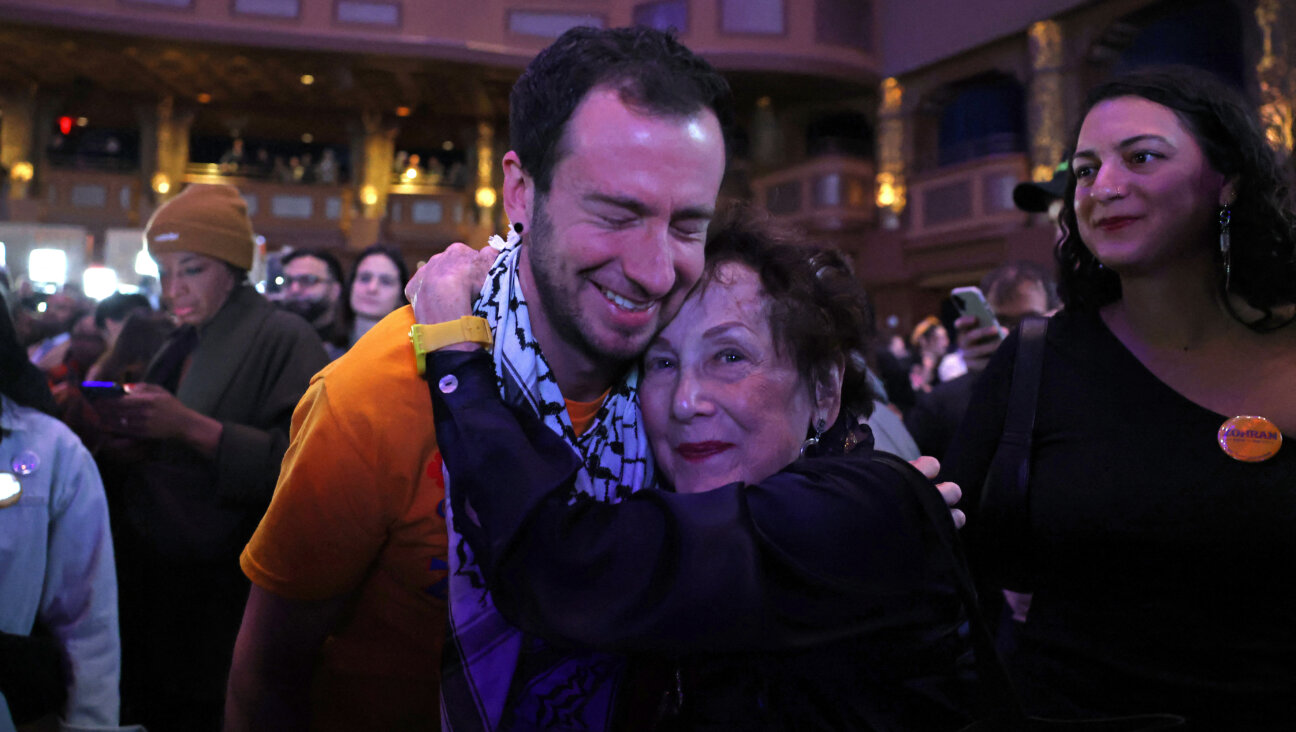Forget Your ‘Bashert,’ God Has Made You Millions To Choose From

Genrikh Bukhsbaum, ?Besherte? Image by COURTESY WWW.JEWISHEXHIBIT.COM
Massechet Sotah in the Babylonian Talmud is not the best place to look for perspectives that contemporary Jews hold on relationships. In fact, you’d imagine that such a tractate would be about as informative as the book of Leviticus is on contemporary attitudes of dinner etiquette.
But there on the very first page of Sotah is something that many people have been taught from an early age and still believe, despite its roundly antiquated hold on love, dating and committed relationships: “Forty days before the creation of a child, a voice from heaven issues forth and proclaims, the daughter of so-and-so will go to so-and-so….”
This suggestion that even before we are born, God determines the one person whom we are going to marry — the concept of bashert — is unproductive and, quite frankly, oppressive to coupled and single Jews alike.
If you are in a relationship or a marriage, the notion of bashert is liable to make you profoundly question whether you are with your intended. While there’s nothing wrong with such questioning, from time to time, couching it in terms of the notion of bashert can usher in regret or even panic — encouraging you to ignore the failings of a relationship or to celebrate, disproportionately, the present stage of your love.
The emphasis on finding “the one” also creates, unnecessarily, a hierarchy of past relationships. But just because you didn’t end up with this man or that woman doesn’t mean that a part of your life was insignificant — or even that a past relationship was less significant than a current one. That night in Morocco and that morning in Nice can matter independently of whether you have since stood under a chupah with someone else.
It is also important to note that the Talmud brings up another source that suggests the concept of bashert applies only to first marriages. So what if your first marriage didn’t work out? Does that mean that God was wrong? Or wicked? To this end, one cannot help but think about Abraham, Hagar and Sarah. If we buy into this notion at all, who was the bashert for Abraham? Sarah, because she was the first wife and the woman with whom the covenant was fulfilled? Or Hagar, because, according to Rashi, she ended up with Abraham after Sarah’s death?
The Talmudic concept of a single bashert presupposes a disappointingly narrow view of love, people and of God. Beautiful, productive and supporting relationships can surely be made with lots of different people, especially as we change throughout our lives.
Meanwhile, if you’re not currently in a romantic relationship, the concept of bashert also puts unnecessary pressure on you to find “the one.”
While it might be nice to believe “there is someone out there waiting for me,” this belief can also induce terrible loneliness. If God’s responsibility is only to assign people to each other, but not to bring them together, then the fact that you have not found your so-called intended is either quite disappointing or quite amusing to God; it reminds me of the uncle that can’t believe you can’t find the afikomen, when he has taped it to your back.
Indeed, the notion of bashert can also feel like lazy thinking. It is one thing to feel grateful for a relationship; it is quite another to think that you somehow managed to find “the one” just by being at The Edison on the right night or by not getting into Yale. It seems to be too deterministic for a religion whose system of commandments requires a continual confirmation of free will. We wouldn’t say, “The car or job or education I ended up getting is the one I was supposed to have.” So why would we say it with something as important as our love life?
As a fantasy, there’s something nice about thinking that maybe right down the block, sitting in that charming little wine bar, smiling through a book of short stories, your bashert waits. It’s good to imagine the romance of possibility and maybe that’s what the authors of Massechet Sotah were doing as well. But within this notion that God makes only one person for you exists the maddening possibility that instead of being right there down the block, that person could be an expat in Shanghai — waiting and waiting and still waiting.
Does God hand out plane fare to help us get to China? Arrange extra time off from work? Make sure she’s at her table sipping her claret instead of across the street counting out her yuan when you arrive? Does God make her say hello? Does God remind you to match your socks? Or whisper to you to unmatch them because she finds that charming?
“The one” is a fantasy, but the reality that there are so many scenarios from which enduring love could emerge is so much more exciting than the fantasy. So, in this age of quantum physics, can we stop talking about bashert — and start talking about its plural, *bashertim?
All this is not to say that if or when you finally decide to make a different kind of commitment to someone that you won’t reorganize your life in an attempt to derive something that is different from that relationship, and that will feel particularly special; we make people special by making special commitments. But it might just be more helpful for everyone if God kept that “voice from heaven” in heaven.
Micah Kelber is a writer and freelance rabbi in Brooklyn. He is currently writing a screenplay about divorce in New York in the 1940s.















